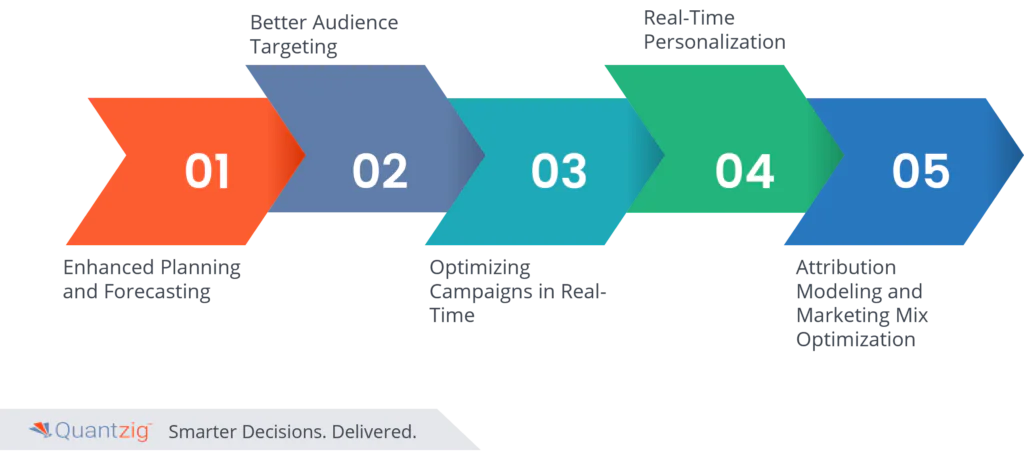The exponential growth of data presents both challenges and opportunities for marketers. Big data is pivotal in addressing the question of processing vast amounts of data efficiently and innovatively to enhance business performance. Its integration into marketing strategies offers unprecedented insights into consumer behavior, preferences, and market trends, revolutionizing the traditional marketing landscape.
Book a demo to experience the meaningful insights we derive from data through our analytical tools and platform capabilities. Schedule a demo today!
Request a Free DemoTable of Contents
The Role of Big Data in Marketing: Why It’s Important
Big data facilitates enhanced planning and forecasting by enabling real-time analysis and decision-making, leading to improved ROI and campaign optimization. It also empowers marketers with better audience targeting, leveraging demographic and geographic information for intelligent segmentation and personalized campaigns. Real-time optimization of campaigns is made possible through big data analytics, ensuring adaptability to changing market conditions.
Moreover, big data enables real-time personalization of content and advertisements based on individual preferences, enhancing customer engagement and loyalty. It also facilitates attribution modeling and marketing mix optimization, allowing for effective allocation of resources across various marketing channels.
In practice, companies like Salesforce and Amazon utilize big data for predictive lead scoring and personalized product recommendations, respectively, demonstrating its tangible benefits in marketing. Leveraging big data analytics solutions, such as those offered by Quantzig, can further drive intelligent actions, improved customer engagement, and increased revenues.
Ultimately, big data provides a comprehensive understanding of customers, optimizes marketing spend, enhances customer engagement, enables data-driven decision-making, and offers a competitive advantage. As marketing continues to evolve in the digital era, the strategic integration of big data remains essential for success. Marketers must grasp its intricacies to effectively implement it and capitalize on its transformative potential.
Applications of Big Data in Marketing
Marketing in the digital age is no longer a guessing game. With the implementation of big data marketing solutions, companies can track and analyze vast amounts of information on customer interactions, preferences, and behaviors. Big data for marketers enables them to create highly targeted campaigns that resonate with specific audience segments, leading to improved customer engagement and higher conversion rates.

Big data in marketing enhances planning and forecasting by broadening data sources and facilitating real-time analysis, improving decision-making and ROI optimization. For instance, Salesforce utilizes predictive lead scoring to prioritize high-converting leads. It enables precise audience targeting through demographic insights, as seen in Amazon’s personalized recommendations. Real-time campaign optimization, exemplified by Starbucks’ use of social media analytics, ensures agility and responsiveness. Moreover, big data enables real-time personalization, exemplified by Netflix’s tailored content suggestions. Additionally, it aids in attribution modeling, as demonstrated by Google Analytics, optimizing marketing budgets for maximum impact.
How Is Big Data Used in Marketing?
Big data empowers businesses with a comprehensive understanding of their user base, unveiling trends, preferences, and behavior patterns. Marketers leverage these insights to shape marketing strategies and product decisions effectively.
Big data enhances customer engagement and retention by providing detailed information on demographics, locations, and interests, enabling personalized experiences and fostering long-term loyalty. Moreover, it aids in marketing optimization and performance evaluation by identifying the most effective campaigns, channels, and strategies, allowing for efficient resource allocation and cost reduction.
Additionally, big data facilitates competitor tracking and operational adjustments by comparing market trends and prices, enabling businesses to stay competitive and attract customers effectively. This strategic value of big data marketing lies in its ability to enhance customer understanding, optimize marketing spend, improve engagement, facilitate data-driven decision-making, and provide a competitive advantage through agility and responsiveness to market dynamics and consumer behaviors.
Experience the advantages firsthand by testing a customized complimentary pilot designed to address your specific requirements. Pilot studies are non-committal in nature.
Request a Free PilotWhy Big Data is the Future of Digital Marketing
- Improved Customer Targeting: The primary benefit of using big data in marketing campaigns is the ability to target customers more effectively. Through big data for customer segmentation, businesses can divide their audience into distinct groups based on behavior, demographics, or purchasing habits. This granular segmentation allows for personalized marketing with big data, which significantly increases the chances of converting leads into loyal customers.
- Predictive Analytics in Marketing: Predictive analytics is a key component of big data marketing strategies. By analyzing historical data, predictive analytics in marketing helps businesses forecast future customer behaviors, market trends, and campaign performance. This enables marketers to anticipate customer needs and make proactive decisions, optimizing their strategies for maximum ROI.
- Real-Time Insights: With the integration of real-time big data marketing, marketers can access live insights into customer behavior as it happens. This enables businesses to adjust their campaigns on the fly, responding to customer actions in real-time. For example, if a campaign is underperforming, real-time data allows marketers to tweak their approach instantly, avoiding wasted efforts and resources.
- Enhanced Decision-Making: One of the most significant advantages of data-driven decision-making in marketing is the ability to make informed choices based on comprehensive data analysis. Instead of relying on assumptions, marketers can leverage marketing analytics with big data to understand what strategies work best. This leads to more effective campaigns and ensures marketing budgets are allocated efficiently.
- Personalization at Scale: Big data for content marketing enables businesses to deliver highly personalized content to customers at scale. Whether it’s personalized product recommendations, tailored email campaigns, or targeted advertisements, big data marketing solutions make it possible to create relevant experiences for every customer, enhancing satisfaction and brand loyalty.
- Optimized Marketing Campaigns: Big data analytics for marketing allows companies to optimize their campaigns continuously. By evaluating the performance of different marketing channels, messaging, and timing, marketers can refine their strategies to maximize engagement and conversions. This is particularly valuable in the context of digital marketing, where customer behavior can change rapidly, and staying agile is crucial.
How Big Data Enhances Digital Marketing Strategies
- Customer Insights and Segmentation: With big data for customer segmentation, marketers can gain deeper insights into their target audience. Analyzing patterns in customer behavior, purchase history, and interactions helps businesses craft more effective digital marketing strategies that resonate with their customers. This segmentation allows for more tailored marketing efforts, improving engagement and customer retention.
- Predictive Targeting: Using big data for marketers in conjunction with predictive analytics in marketing, businesses can predict future trends and behaviors, allowing them to tailor their offerings proactively. For instance, a retail company might use big data marketing strategies to predict which products will be popular during certain seasons, enabling them to adjust their inventory and marketing campaigns accordingly.
- Real-Time Adjustments: The ability to make real-time big data marketing adjustments ensures campaigns stay relevant and responsive to customer needs. Marketers can identify issues or opportunities within campaigns as they happen, allowing for real-time modifications that enhance performance.
Get started with your complimentary trial today and delve into our platform without any obligations. Explore our wide range of customized, consumption driven analytical solutions services built across the analytical maturity levels.
Start your Free TrialWay Ahead with Big Data
In conclusion, big data is a game-changer in the field of marketing, revolutionizing how businesses understand, engage, and retain customers. The applications of big data in marketing are diverse and powerful, offering tangible benefits that extend beyond traditional marketing practices. As the digital landscape continues to evolve, the strategic integration of big data will undoubtedly remain a cornerstone for marketing success.
Big data in marketing can transform marketing as a discipline by offering the ability to understand customers better, in real-time and on a large scale. Like any new technology that aims at changing the status quo, marketers need to understand it in detail before implementing it.
Conclusion
As the digital marketing landscape continues to evolve, big data marketing strategies will play an increasingly important role. Data-driven marketing is not just a trend but a necessity for businesses aiming to thrive in the competitive digital world. By leveraging the power of big data marketing solutions, brands can deliver personalized experiences, optimize campaigns, and make smarter decisions based on data. Whether it’s improving customer targeting, refining content strategies, or using predictive analytics in marketing, the future of digital marketing is undeniably powered by big data.
Incorporating big data for content marketing, customer segmentation, and real-time marketing into your digital strategy is no longer optional—it’s the key to staying ahead of the competition in today’s data-driven world.



